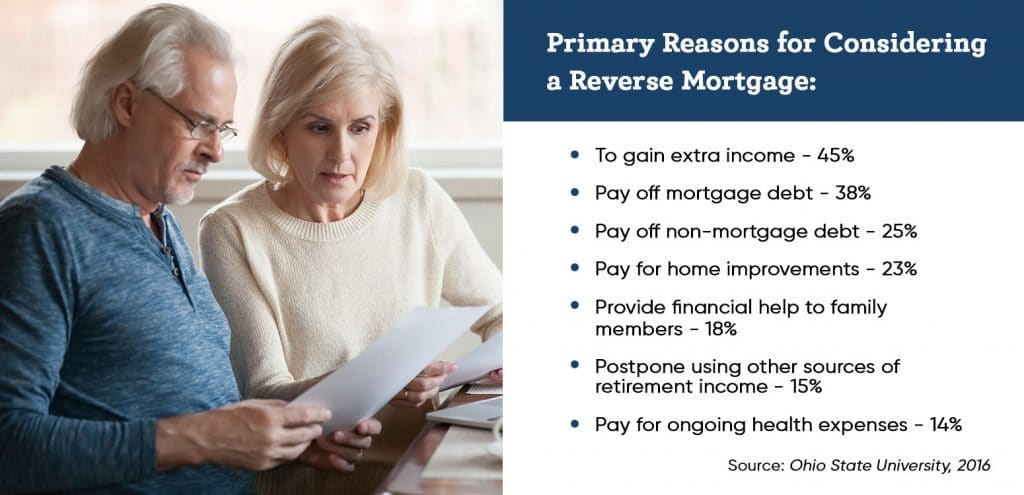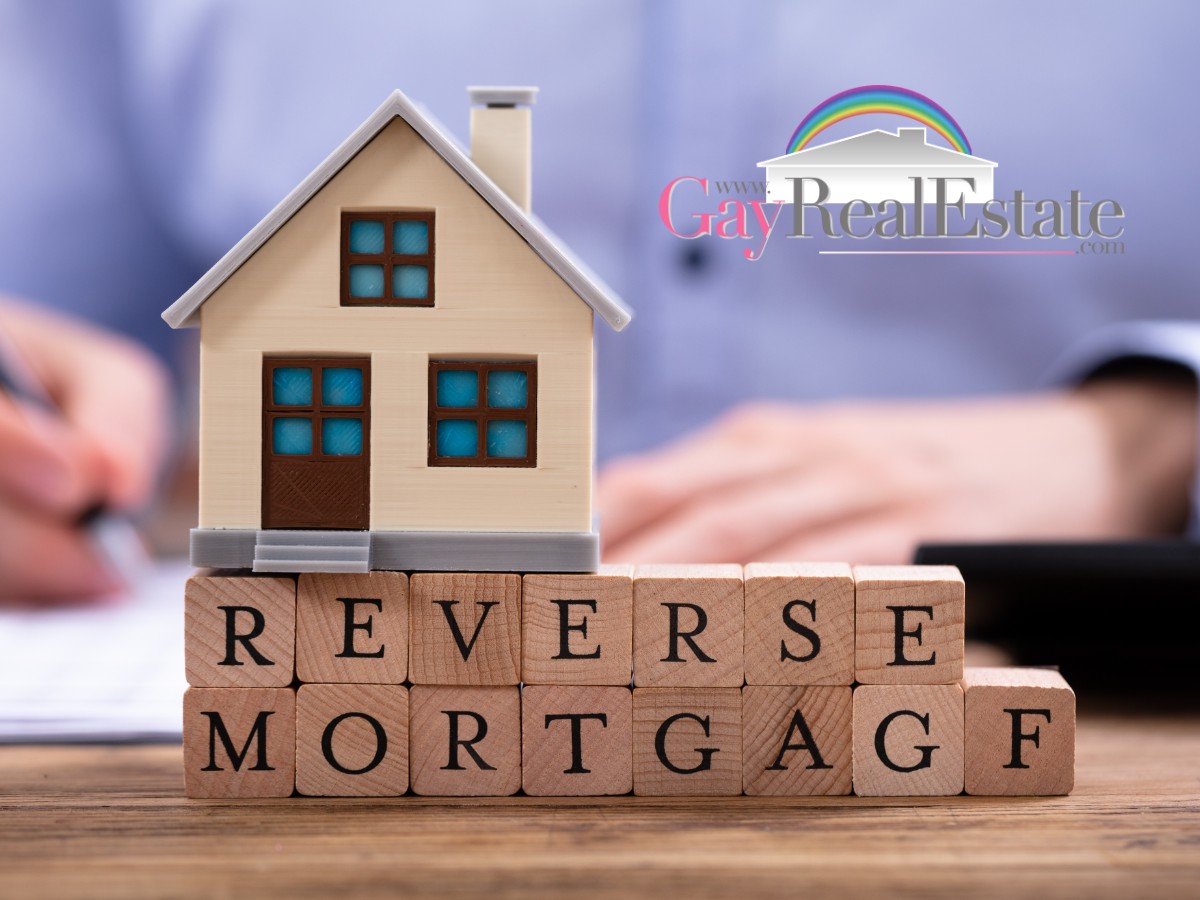Empower Your Retired Life: The Smart Means to Purchase a Reverse Mortgage
As retirement approaches, several individuals look for effective methods to boost their financial independence and wellness. Amongst these approaches, a reverse home mortgage emerges as a practical choice for home owners aged 62 and older, permitting them to tap into their home equity without the necessity of regular monthly repayments.
Comprehending Reverse Home Loans
Recognizing reverse home mortgages can be crucial for homeowners seeking financial adaptability in retirement. A reverse home loan is a monetary product that enables eligible homeowners, usually aged 62 and older, to convert a part of their home equity into cash. Unlike traditional mortgages, where consumers make month-to-month settlements to a lending institution, reverse home mortgages enable property owners to get payments or a lump amount while preserving possession of their property.
The quantity offered with a reverse mortgage relies on numerous elements, including the home owner's age, the home's worth, and present rates of interest. Significantly, the car loan does not need to be settled up until the homeowner markets the home, leaves, or dies.
It is necessary for prospective borrowers to recognize the implications of this economic product, consisting of the effect on estate inheritance, tax factors to consider, and ongoing duties associated to residential or commercial property upkeep, taxes, and insurance policy. Additionally, counseling sessions with licensed professionals are often called for to guarantee that consumers fully understand the conditions of the finance. In general, a detailed understanding of reverse home loans can encourage homeowners to make educated choices about their monetary future in retired life.
Advantages of a Reverse Mortgage
A reverse home loan supplies several compelling advantages for qualified homeowners, especially those in retirement. This financial tool permits elders to convert a part of their home equity right into cash money, providing important funds without the requirement for month-to-month home mortgage payments. The cash acquired can be utilized for various functions, such as covering medical costs, making home renovations, or supplementing retired life income, thus improving general monetary versatility.
One substantial benefit of a reverse home mortgage is that it does not call for settlement until the house owner leaves, markets the home, or dies - purchase reverse mortgage. This attribute makes it possible for retirees to keep their way of living and fulfill unanticipated prices without the worry of month-to-month settlements. In addition, the funds gotten are commonly tax-free, permitting house owners to use their money without worry of tax implications
Furthermore, a reverse mortgage can give tranquility of mind, understanding that it can act as a financial safeguard throughout difficult times. Property owners also preserve possession of their homes, ensuring they can continue staying in a familiar environment. Inevitably, a reverse home loan can be a tactical financial source, equipping retirees to handle their financial resources efficiently while appreciating their gold years.
The Application Process
Browsing the application process for a reverse mortgage is a crucial step for home owners considering this economic option. The initial stage includes evaluating qualification, which generally calls for the house owner to be a minimum of 62 years click for info of ages, own the property outright or have a reduced mortgage balance, and inhabit the home as their main residence.
Once qualification is verified, house owners must go through a counseling session with a HUD-approved counselor. This session makes certain that they completely recognize the implications of a reverse home mortgage, including the obligations entailed. purchase reverse mortgage. After completing counseling, candidates can proceed to gather essential documentation, consisting of evidence of income, possessions, and the home's worth
The next step involves sending an application to a lender, who will certainly analyze the financial and residential property qualifications. An evaluation of the home will certainly additionally be conducted to determine its market worth. If approved, the loan provider will certainly offer loan terms, which ought to be examined meticulously.
Upon approval, the closing process follows, where final files are signed, and funds are paid out. Comprehending each stage of this application procedure can dramatically boost the homeowner's confidence and decision-making concerning reverse mortgages.

Key Considerations Prior To Purchasing
Purchasing a reverse mortgage is a substantial economic decision that requires careful consideration of numerous crucial aspects. Recognizing your eligibility is essential. Homeowners have to go to least 62 years of ages, and the home needs to be their primary house. Examining your financial requirements and objectives is just as vital; figure out whether a reverse home loan aligns with your lasting strategies.

A reverse home loan can affect your eligibility for particular federal government benefits, such as Medicaid. By thoroughly evaluating these factors to consider, you can make a much more enlightened decision regarding whether a reverse mortgage is the appropriate economic method for your retirement.
Maximizing Your Funds
As soon as you have actually secured a reverse mortgage, properly handling the funds becomes a top priority. The versatility of a reverse mortgage permits house owners to utilize the funds in numerous methods, but Read Full Article critical planning is essential to optimize their benefits.
One vital method is to develop a budget plan that outlines your regular monthly expenses and monetary goals. By determining necessary costs such as healthcare, real estate tax, and home upkeep, you can assign funds as necessary to ensure long-lasting sustainability. In addition, think about making use of a portion of the funds for financial investments that can create income or value with time, such as dividend-paying stocks or shared funds.
One more vital aspect is to preserve an emergency situation fund. Reserving a book from your reverse home mortgage can aid cover unexpected expenses, giving comfort and financial stability. Moreover, speak with a financial consultant to check out feasible tax obligation implications and how to integrate reverse home loan funds right into your total retirement strategy.
Ultimately, prudent management of reverse home loan funds can improve your economic security, permitting you to appreciate your retired life years without the stress and anxiety of economic unpredictability. Mindful preparation and educated decision-making will certainly make sure that your funds function successfully for you.
Final Thought
In verdict, a reverse home loan presents a sensible financial approach for senior citizens looking for to improve their Get More Information retirement experience. By transforming home equity into easily accessible funds, individuals can attend to important expenditures and protected added monetary sources without incurring regular monthly settlements.
Comprehending reverse home mortgages can be important for home owners seeking monetary flexibility in retirement. A reverse home loan is an economic product that enables qualified home owners, usually aged 62 and older, to transform a portion of their home equity into money. Unlike typical mortgages, where debtors make month-to-month payments to a lender, reverse home loans make it possible for home owners to get repayments or a swelling sum while keeping possession of their home.
Generally, a detailed understanding of reverse home mortgages can empower homeowners to make informed choices concerning their economic future in retired life.
Seek advice from with a monetary consultant to explore possible tax obligation effects and just how to incorporate reverse home loan funds into your overall retired life approach.
Comments on “Is It the Right Time to Purchase Reverse Mortgage? Here’s What to Consider”